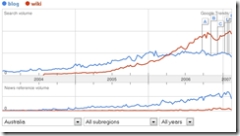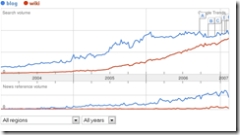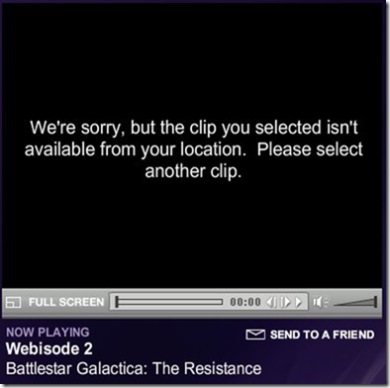Home » australia (Page 26)
Category Archives: australia
Indigenous Health is Australia’s Katrina?
While I was away, the health, welfare and abuse issues in some indigenous Australian communites has flared into the political spotlight. The issues aren’t new, but several new reports and issues have focused the debate markedly. That said, I was still quite suprised to hear Australia Prime Minister John Howard comparing these issues to the 2005 Katrina disaster in New Orleans:
“Many Australians, myself included, looked aghast at the failure of the American federal system of government to cope adequately with hurricane Katrina and the human misery and lawlessness that engulfed New Orleans in 2005,” he said in a speech to the Sydney Institute last night. We should have been more humble. We have our Katrina here and now. That it has unfolded more slowly and absent the hand of God should make us humbler still.”
The religious tones here seem particularly unhelpful, and casting this as Australia’s Katrina makes light of the fact that these issues are a systemtic issue which have been around for some time. Sending in the troops (literally) may not be the best approach for communities which still have very real memories of children being forcibly removed from families a generation earlier. That said, change has to happen, and I tend to agree here with Democrat Senator Andrew Bartlett:
There has been a fair degree of cynicism amongst many of the responses to the government’s plan, including from many Indigenous Australians. Given the past history of many grand government announcements which have not been followed up with adequate resourcing or implementation once the headlines have died down, there is every reason for people to be cynical. However, that should not be a reason to try to tear this plan down, it should be a reason to keep the focus on it, to do everything possible to translate all the current waves of rhetorical flourishes into real and lasting positive change.
For your own reading, please …
[X] Read The Northern Terrtitory Inquiry into the Protection of Aboriginal Children from Sexual Abuse and the many, many problems it describes (or, at least, look at the Foreward);
[X] See North Queensland Aboriginal leader Noel Pearson being interviewed last week on the 7.30 report about some of the strategies being implemented (which were recommended in a report he chaired);
[X] But also keep in mind that the timing of this is political since former WA premeir Geoff Gallup called this issue a “national disaster” in 2002 and called for broad-scale national and state-level action in that year (“There needs to be a national approach to this, it’s not just a Western Australian issue”). None happened until a closely run Federal election was looming. (That’s a reason to try and ensure that the energy galvanised here is directed in a sustained way, not a short-burst political way. And, to be honest, even gettings things right here doesn’t make up for all the years that the Howard goverment has done nothing, despite the issues being clear as day.)
Academic Ethics, Privacy and Transparency … all coming soon to YouTube!
Australia’s QUT has been in the grip of a very public controversy recently which dovetails between issues of freedom of speech, academic ethics and the transparency of university processes. The controversy came to light and media attention on 11 April this year when two QUT academics, John Hookham and Gary MacLennan, published an article in The Australian entitled ‘Philistines of relativism at the gates’. In it, Hookham and MacLennan very publicly took issue with the ethics of work being done by PhD candidate, Michael Noonan:
A time comes when you have to say: “Enough!”, when you can no longer put up with the misanthropic and amoral trash produced under the rubric of postmodernist, post-structuralist thought. The last straw, the defining moment, came for us when we attended a recent PhD confirmation at the Queensland University of Technology, where we teach. Candidate Michael Noonan’s thesis title was Laughing at the Disabled: Creating comedy that Confronts, Offends and Entertains. The thesis abstract explained that “Laughing at the Disabled is an exploration of authorship and exploitation in disability comedy, the culmination of which will be the creation and production (for sale) of a six-part comedy series featuring two intellectually disabled personalities. “The show, entitled (Craig and William): Downunder Mystery Tour, will be aimed squarely at the mainstream masses; its aim to confront, offend and entertain.” (Editor’s note: the subjects’ names have been changed to protect their privacy.) Noonan went on to affirm that his thesis was guided by post-structuralist theory, which in our view entails moral relativism. He then showed video clips in which he had set up scenarios placing the intellectually disabled subjects in situations they did not devise and in which they could appear only as inept. Thus, the disabled Craig and William were sent to a pub out west to ask the locals about the mystery of the min-min lights. […]
At the seminar we were told there was a thin line between laughing at and laughing with. There is no such thin line. There is an absolute difference that anyone who has been laughed at knows. We must admit with great reluctance that at the seminar we were alone in our criticism of the project. For us, it was a moment of great shame and a burning testimony to the power of post-structuralist thought to corrupt. It is not our intention here to demolish the work of Noonan, an aspiring young academic and filmmaker. After all, ultimate responsibility for this research rests with the candidate’s supervisory team, which included associate professor Alan McKee, the faculty ethics committee, which apparently gave his project total approval, and the expert panel, which confirmed his candidacy. […]
What we have instead is the reality that cultural studies is in the grip of a powerful movement that we call the radical philistine push. It is this same movement that has seen the collapse of English studies and the consequent production of graduates who have only the scantiest acquaintance with our literary heritage. It is also undermining the moral fabric of the university.
So, what starts with ethical questions about a particular thesis, quickly becomes a much more generic complaint about the corruption of education by poststructuralist and postmodern theory and approaches. I know nothing of the people writing or mentioned in this article, but have to say after reading the piece I wasn’t swayed; my sympathies were more with Michael Noonan than anyone else, because as a PhD candidate I know I would have been almost destroyed by such public denouncing of my work. This, I should add, is not a comment on the quality on the work being or proposed – I know nothing beyond the article above and the surrounding debate, and haven’t seen any of the footage mentioned – but rather a comment on the process and the reasonable expectation that any criticism of a candidate’s work be handled within the university as long as possible. I’m not saying there is never a case for ‘going public’ with dismay about certain research, but from what I’ve read I believe Hookham and MacLennan took that step far too early. More to the point, combining criticism of a specific project with a very generic attack on a particular body of theory and its influence on teaching seems a less than generous way of dealing with the work of a PhD candidate.
The issues raised here also beg serious questions about transparency and universities. There is a lot of talk about the need to transparency of research outcomes since (most) Australian universities are at least partially publicly-funded. I quite agree with that notion. However, I think the idea of the processes of a university being taken public under the rubric of transparency tend to skew what makes it into the public arena. Selectively releasing aspects of a process (such as an ethics review process and confirmation of candidature) around research which clearly relies on careful contextualisation is bound to produce a one-sided picture. Tellingly, when Hookham and MacLennan’s article was republished in Online Opinion, the were comments from a student – using the handle WWSBD – who’d had Noonan (the candidate) as a lecturer, praising his efforts to educate student about people with disability. Moreover, this is the only place I’ve seen Noonan himself comment publicly:
I am at the student at the centre of Hookham and MacLennan’s attacks.
I thank WWSBD for understanding and appreciating my work in its context. I appreciate the words of Anecdote, who understands that a work must be seen and placed in context before it should be attacked. And I am disappointed for bedwin, who has lost all respect for me on the basis of an uninformed and incorrect article.
Much has been assumed about my project, my integrity and my intentions. Very little of it is based on truth. The simple facts are these: the excerpts I showed at my PhD confirmation seminar were presented in the context of exploring and discussing issues of authorship and representation in disability. My project seeks to empower the disabled, to give them a voice through comedy. Each clip was prefaced with my own thoughts about whether or not this had been achieved.
As a sessional staff member at QUT, I can think of nothing more deplorable than attacking a student’s incomplete research in a public forum. Hookham and MacLennan have made no effort to read my PhD confirmation document (it was offered) and they rejected my attempts to meet and discuss their concerns.
To date I have not sought to respond to their attacks in print. But I refuse to be further bullied and vilified before the public, my peers and my students.
However, the story doesn’t end there. Earlier this month The Australian report that Hookham and MacLennan are now facing a disciplinary hearing at QUT for their public comments, with the university arguing that the two unfairly attacked the candidate and his supervisory team. Now, whatever their views, Hookham and MacLennan seem to have a reputation as inspirational teachers themselves, and the news of their censure galvanized some of the QUT student body to defend their actions on the basis of free speech. The student campaign is visible through it’s “Save Our Lecturers” MySpace page. Moreover, over at Martin Hirst’s blog, he has posted ‘Freedom of Speech disabled at QUT’ which points to this documentary which is now available at YouTube:
(Hirst is a friend of Hookham and MacLennan’s, and his post also contains the full text from Hookham and MacLennan’s original article in The Australian, as well as some additional commentary from The Australian and subsequent letters to editor.)
The YouTube documentary clip, by QUT student Adrian Strong, is very compelling; Hookham and MacLennan both come across as intelligent, compassionate teachers and academics who have good cause for concern. My point here is not to judge the debate being documented in this clip – although I imagine it would be extremely compelling for many people. Rather, in the era of participatory culture and digital media, this clip is indicative of a very profound change which can see debates and arguments that once would have remained closed suddenly being open to public viewing and public debate. In such an era, digital literacy is extremely important – the ability to create, edit and share such a clip is a key part of the ability to make a case in the public eye. It’s no surprise that QUT, which has Australia’s most renowned Creative Industries faculty, should be the source of the first such debate in Australia (to my knowledge, at least).
Illustrating my point, I just noticed another posted by the same YouTube user who posted the clip above (and thus, I presume, also be Adrian Strong) which talks in even stronger terms about a perceived campaign of censorship at QUT:
(Again, let me reinforce, I don’t know enough about the other things going on to really judge this debate, but I do know that the perception of censorship certainly doesn’t add to the reputation of any university. However, like the first clip, without any further rebuttal, this clip is likely to be very persuasive to viewers.)
Update: In ‘Dissenting dons out in the cold’, Andrew Fraser reports in The Australian that the saga ended with Hookham and MacLennan both being suspended without pay for 6 months from QUT.
Searching Blogs Vs Wikis – Australians Prefer Wiki (The World Prefers Blog)
I was playing with Google Trends and their comparison function and noticed that you can now limit searches to regions (ie just Australia, for example). I was playing around looking at the comparative popularity of ‘blog’ versus ‘wiki’ and found something interesting: cumulatively, global searchers are still typing in ‘blog’ more, but in Australia, ‘wiki’ is a more popular term, and has been since the third quarter of 2006. Since there’s no scale on Google Trends, I’ve no numbers attached to these trends, but the results are interesting nevertheless.
Australia is looking for wikis…
While the world is looking for blogs…
[Click either image to expand.]
I’ve no idea why wikis are more popular in Australia … perhaps something to do with Wikipedia? I note in the News trends (the smaller bottom graph), blogs are still mentioned a lot more in the mainstream media. I wonder what it is about wikis and Aussies?
V-Tech Massacre: Tasteless Videogame based on the Virginia Tech Massacre
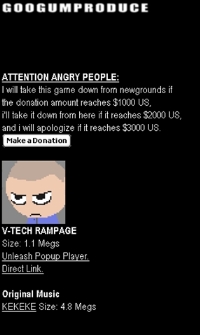 A 21-year old Sydney man, Ryan Lambourn, has sparked outrage by creating a game based on the Virginia Tech Massacre. The game, called V-Tech Rampage, is far from technically impressive, but has nevertheless understandably upset quite a few people. One of the real difficulties is that while there have been a number of important political games and simulations which have tried to ‘speak’ about political issues (from September 12 to Donkey John to World Without Oil) this game – if it does have a point – really doesn’t make that clear. Over at Joystiq, the creator of the game based on the Columbine Massacre is quoted, citing his disappointment with the V-Tech game:
A 21-year old Sydney man, Ryan Lambourn, has sparked outrage by creating a game based on the Virginia Tech Massacre. The game, called V-Tech Rampage, is far from technically impressive, but has nevertheless understandably upset quite a few people. One of the real difficulties is that while there have been a number of important political games and simulations which have tried to ‘speak’ about political issues (from September 12 to Donkey John to World Without Oil) this game – if it does have a point – really doesn’t make that clear. Over at Joystiq, the creator of the game based on the Columbine Massacre is quoted, citing his disappointment with the V-Tech game:
Danny Ledonne, creator of Super Columbine Massacre RPG, writes on Lambourn’s site, “It would appear to me that Ryan has no intention of doing much other than making money and gaining immediate recognition after the Virginia Tech shooting. Inevitably, comparisons between SCMRPG and VTech Rampage are being made right now. Some bloggers despise both games equally whereas others recognize a level of commentary that SCMRPG attempted which was not evident in VTR. For myself I wish to point out that SCMRPG was never a for-profit endeavor and thus I never posted statements like that which is on the VTR game’s homepage”
Adding fuel to the Lambourn posted a notice say he would only remove the game if he received $2000 in donations. This sparked even more vitriolic comments on the game, but in those comments Lambourn defends the donations statement, say it was a further aspect of satire:
PiGPEN – May 15th 2007
Danny, the donation thing is there as a joke against all the people commanding me to take my game down. I didnt think anyone would donate money to it and so far my paypal account has proven me right (BUT I COULD USE SOME FUCKING MONEY THANKS!).
And i’d appreciate if you didnt use the name “Ryan”. That name is reserved for my close friends and family… i cant help the people that gleaned personal information from my website but i would hope you would have the courtesy to not disrespect me in such a manner on my own website…Danny.
Of course, the irony of courting controversy and then being surprised when it results in negative public sentiment (and the post of Lambourn’s full name, address and phone number in numerous locations online) is pretty thick. On the web, even thought two wrongs don’t make a right, they’re never far from each other!
See The Age for more details.
Update (17 May, 2:25pm): The ‘official’ version of the game hosted by Lambourn (and this whole website) have been taken down. (That said, given the nature of digital culture, if anyone looked I’m sure they’d find another copy somewhere…) Lambourn’s website now sports a “This Account Has Been Suspended” notice.
Update 2 (4 June 2007): After reviewing the case, Australia’s Office of Film and Literature Classification gave the game an MA15+ rating, not banning the game as had been suggested.
Gail Jones shortlisted for the Miles Franklin Award
 A huge congratulations to my UWA colleague, Gail Jones, on being shortlisted for this year’s Miles Franklin award for her new book Dreams of Speaking; Vintage (Random House Australia). Her competition this year is pretty impressive, too: Careless by Deborah Robertson; Carpenteria by Alexis Wright; and Theft: A Love Story by Peter Carey.
A huge congratulations to my UWA colleague, Gail Jones, on being shortlisted for this year’s Miles Franklin award for her new book Dreams of Speaking; Vintage (Random House Australia). Her competition this year is pretty impressive, too: Careless by Deborah Robertson; Carpenteria by Alexis Wright; and Theft: A Love Story by Peter Carey.
The winner will be announced on June 21st.
24 Hours of Flickr
Today 05.05.2007 (which is one of those lovely dates which makes sense on both US and normal people’s calendars), photography sharing and community building uber-site, Flickr, is running an event called 24 Hours of Flickr. The details:
To celebrate this global community, we invite you to join us in “24 Hours of Flickr” – a day-long global photo project. On May 5, 2007, grab your camera and whatever else you need, and chronicle your day in pictures. The group’s photos will be featured at Flickr events around the world this summer and in a companion book, which will contain a selection of photographs chosen from the group…
While the day is just beginning in the US, it’s well into the night here in Perth. I’ve remembered to carry my camera some of the day, but a lot of what I did wasn’t photography-friendly (I didn’t think taking pictures in the screening of Spider-Man 3 would be overly well received!). I’ve taken a few shots of my day in a set here. Thankfully, the paucity of shots today meant is was rather easy picking my one decent shot for the Flickr pool. The only better candidate was a photo of Emily’s work-in-progress painting of Tulips, but I it seemed wrong to post a photograph of a painting for a photography pool! So here’s the image I settled on …
It’s called Wrecked Angles (oh, I do love a good pun); it’s all rectangles, unfinished painted walls, security-wired windows and cracked glass. And yet, in black and white, aesthetically quite fascinating. (It was taken in Subiaco, Western Australia, but by no means indicative of the suburb!) It doesn’t really look that impressive scaled down, but take a look full-size and see what you think.
I can’t wait to see what other photos emerge during the day! 🙂
“We’re sorry, but the clip you selected isn’t available from your location:” Watching Battlestar Galactica in Australia and the Tyranny of Digital Distance
I just submitted an abstract for the Media International Australia special issue ‘Beyond Broadcasting: TV for the Twenty-first Century’. Here it is:
“We’re sorry, but the clip you selected isn’t available from your location:” Watching Battlestar Galactica in Australia and the Tyranny of Digital Distance
[Figure 1. Screen-capture from http://www.scifi.com/battlestar/, 11 September 2006]
In the late 1960s, conservative Australian historian Geoffrey Blainey coined the term “the tyranny of distance” to describe how the geographic gap between Australia and the centres of the Western world (US, UK) played a fundamental role is shaping the Australian psyche and character (Geoffrey Blainey, The Tyranny of Distance, Sun Books: Melbourne, 1966). Thirty something years later and the world is far more widely considered a global village; the world wide web, email and a million other applications have made real-time information-heavy communication and commerce the norm. However, while information transfers have made ‘distance’ much less of a concern in a number of ways, many policies, practices and systems of commerce still operate as though they are centred on goods moving at the speed of physical shipping, not allowing for information moving at the speed of light down a copper or optical wire. In an era when ‘the tyranny of distance’ means so much less in many contexts, this paper will argue that in the multimedia markets of contemporary society there is, rather, a prevailing tyranny of digital distance which marks out those areas of communication and commerce in which the potential and, indeed, expectation of synchronous global culture (at least for English-speaking countries) leads to constant state of confusion and annoyance – on both personal and legal levels – when those expectations are not met.
The North American-produced television series Battlestar Galactica, re-imagined for the twenty-first century (from an original 1970s series), has consistently been at the cutting edge of television and cross-media. Executive producer Ronald D. Moore and the Battlestar team utilise not just blogs and production-side video-blogs, but also create episodic commentary podcasts, make deleted scenes available online, and have even put two full episodes online for free for viewing. Likewise, Battlestar was one of the first shows available via Apple’s online iTunes Store. Given the amount of extra online content, and the show’s science fiction genre, Battlestar has a large and very active fan community who consume both the television show itself and the officially produced extra material, as well as actively creating and discussing their own derivative ‘fannish’ works ranging from blog commentaries to fan-created videos. Thus, when the show’s producers launched a series of 3 to 4 minutes ‘webisodes’ to re-build interest in the show prior to the launch of its third season, fans across the (wired) globe were understandably excited. However, when citizens of Australia, the UK, Canada or any other country outside the US tried to view these webisodes, they were met with a notice saying: “We’re sorry, but the clip you selected isn’t available from your location.” The owners of Battlestar (NBC) elected to restrict these webisodes to residents of the US only. This decision upset fans across the global Battlestar audience, with US fans quickly circumventing the restrictions and passing copies of the webisodes to their international fellows. In this paper, I will contend that this moment typifies the tyranny of digital distance, exemplifying the legal, ethical and practical issues raised when a globally-promoted television series ‘centres’ on a single national audience. I outline the difficulties of ‘watching’ Battlestar from Australia, and argue for distribution modes which are more in keeping with the technological (and fan-led) potential of digital distribution.
As you might imagine, this paper will draw together my previous thinking about the tyranny of digital distance which you can read about here and here. I’m also finishing off another Battlestar-related paper that stopped being written for a year, but is now being finished off for a new collection. It’s going to be a busy month, but I’m hopeful both of these will be well polished before Emily and I get married on June 9th (presuming this abstract is accepted). Wish me luck!
Update (8 May 2007): The abstract has been accepted! Thankfully, though, full papers aren’t needed until August 1st so I’ll be writing this after Emily and I return from our honeymoon (in Venice!!) :).
Update 2 (21 September 2007): The full version of this paper has been accepted after peer review, and will appear in Media International Australia issue 126, which is scheduled to be released in February 2008.
Update 3 (26 March, 2008): You final version of this paper has appeared, and you can read it following the link from this post.
Apparently I’m in Vogue
 You’ll forgive the title to this post, I’ve never been able to let a good pun go and I doubt I’ll ever be able to use that one again. It’s true, though: I was interviewed about a month ago by Cathrin Shaer, a New Zealand-based writer for Vogue Australia who was writing a piece on life online. She was trying to do an awful lot in one article (talking about MySpace, Flickr, YouTube, Second Life, etc.) but somehow my name came up and I ended up talking with her for almost an hour about the complexities of interaction in different online modes. Clearly the bit that stuck was about Second Life. Here is the snippet from that interview which appeared today in ‘A life less ordinary’ (Vogue Australia, May 2007):
You’ll forgive the title to this post, I’ve never been able to let a good pun go and I doubt I’ll ever be able to use that one again. It’s true, though: I was interviewed about a month ago by Cathrin Shaer, a New Zealand-based writer for Vogue Australia who was writing a piece on life online. She was trying to do an awful lot in one article (talking about MySpace, Flickr, YouTube, Second Life, etc.) but somehow my name came up and I ended up talking with her for almost an hour about the complexities of interaction in different online modes. Clearly the bit that stuck was about Second Life. Here is the snippet from that interview which appeared today in ‘A life less ordinary’ (Vogue Australia, May 2007):
Tama Leaver, a lecturer at The University of Western Australia whose research interests include exploring how humans interact with technology, has used Second Life for business meetings: “Most of the people working in my field are spread across the globe. I’ve participated in teleconferencing, but it’s better of have a conference in Second Life because you’re all in a room together, rather than just disembodied voices.” Apparently, even if you’re meeting with a bunch of serious academics, it doesn’t matter if you look like a cartoon character. “There’s a great parallel in animated films,” Leaver explains. “We understand what’s going on in an animated character’s face — most people understanding what Shrek was saying.”
Not exactly mind-blowing stuff on my part. Also, I suspect there are a few sentences Shaer could have left in since there was somewhat more space and substance between talking about academic discussion in Second Life and Shrek (for the record, I’ve never met anyone online or offline who looks like Shrek – while the facial features might be there, no one I’ve met was actually green). That said, it’s interesting to see interest in social software spreading as far as Vogue. (Although I was a little surprised that they didn’t use any Second Life screenshots for illustration – and what they did use seemed like a bad high school art collage – perhaps the Vogue graphics people didn’t actually make it in-world).
‘Ghosts of blogging’?
In light of the recent tragic chatroom/webcam suicide, I wondered what an article “Ghosts of blogging haunt net cemetery” might have to say about the role of blogs after a blogger’s life. Alas, this has to be one of the worst, ignorant, mainstream-media puff pieces in a long time:
In the latest entry on her personal weblog, Lindsay Lohan, the hard-partying Hollywood actress, was in characteristically bubbly form. “Hey guys, I’m soooo sooo sorry I haven’t written in a while!!” she wrote. She was heading off to New York for two days of photo-shoots, then to Toronto in Canada for a week of filming, then back to Los Angeles again. The entry ended: “I just wanted to check in, I’ll try and write more … xx LL.” It has been a long wait for any Lohan fans who may be hoping for an update. That entry was posted on October 15, 2003.
Lohan’s blog has since taken its place in the internet’s fastest-growing graveyard – of an estimated 200 million blogs that have been started, then abandoned.
The extraordinary failure rate of online diaries and claims that interest in blogging will soon begin a precipitous slide are sparking an intriguing debate about the future of self-expression on the internet and whether blogs, once seen as revolutionary, are destined to become a footnote in the history of computing.
To the embarrassment of millions of internet users – from Hollywood celebrities such as Lohan, Melanie Griffith and Barbra Streisand to countless ordinary parents, workers and would-be poets – the evidence of failed diary-keeping cannot be easily erased from search engines that continue to provide links to blogs that have lain dormant for years.
This article clearly commits many of the most juvenile mistakes about writing regarding blogs — no, not all blogs are online diaries; no, celebrities who blog are no more typical of bloggers than they are of people — but even a journalist who has never read a blog should feel a little silly making the leap to describing the ‘extraordinary failure rate’ of blogs. Or are blogs, unlike regular diaries, or pretty much any other form of narrative or writing – the only form which is supposed to be endless? Blogs have been around for a long time and, like most other things, many blogs have had their natural lifespan, dictated by the purpose for which they were originally constructed. Some blogs are used in education – and thus often have a lifespan of a semester or two; some are issue-driven and may end when that issue is resolved; indeed some are diaries, but like hardcopy diaries, they tend to get left behind after a few years.
All of those gripes aside, the article did make two good points: firstly, that the exponential rise of blogging has to slow soon (because exponential means, quite literally, that there would have to be more blogs than people within a few years at recent growth rates); and secondly that citizens of a digital culture may be shifting their focus to other platforms like YouTube and MySpace. That’s not really an argument about the death of blogging, though – it’s more testimony to the maturing of the world of social software in that many more options available for those many networks of interest and friendship which life online can facilitate.
Of course, I wonder why no one writes about how many MySpace profiles are abandoned? (Far be it from me to points out that the same folk that own MySpace own The Australian).
I guess one has to ask The Australian, if blogs are on the decline, why does your blog section keep growing?
Four Corners: ‘You Only Live Twice’
In conjunction with their purchase of a Second Life Island, the ABC (Australian Broadcasting Corporation) dedicated a full Four Corners programme to exploring the world of Second Life. It was actually quite a fair representation of SL (at least, as I understand it, only having spent a few hours in-world); it was also neatly structured to familiarise viewers who’ve never heard of virtual environments with SL as it began with Ticky Fullerton’s (the journalist’s) signing-up process, and showed both in-world and material-world footage as she developed her avatar, checked out Orientation Island and eventually explored the people, the markets and the inevitable red-light districts of SL.
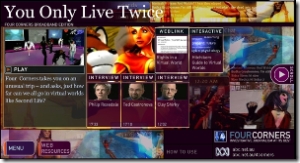 Also of interest was the way in which the programme was presented – it wasn’t just a 45 minute slot, but also has a substantial online presence on the Four Corners website. The layout of the extra material is a little busy for my taste, but the wealth of material is excellent – there are longer versions of the interviews with Philip Rosedale (Second Life’s US creator), Ted Castranova (a well-respected academic voice on Virtual worlds and virtual economies) and Clay Shirky (SL’s most prominent critic). I particularly like these ‘raw’ interviews as you can hear all the questions asked, something that regularly gets lost in the tight editing which happens in putting a 45 minutes show together.
Also of interest was the way in which the programme was presented – it wasn’t just a 45 minute slot, but also has a substantial online presence on the Four Corners website. The layout of the extra material is a little busy for my taste, but the wealth of material is excellent – there are longer versions of the interviews with Philip Rosedale (Second Life’s US creator), Ted Castranova (a well-respected academic voice on Virtual worlds and virtual economies) and Clay Shirky (SL’s most prominent critic). I particularly like these ‘raw’ interviews as you can hear all the questions asked, something that regularly gets lost in the tight editing which happens in putting a 45 minutes show together.
The ABC, like the BBC, is not hampered by trying of extract every last cent for their productions; rather, their mission statement is to disseminate their shows as accessible to Australians as is possible. It means these sort of extended versions are part of their core mission, and I’m quite impressed with the amount online (my only gripe is that it’s all flash video, so not so easy to download – a concern if I wanted to use a few minutes of one of the interviews in a lecture!).
For those who prefer to check out a lo-fi version before spending the time watching the videos, there is a full transcript of the ‘You Only Live Twice’.

